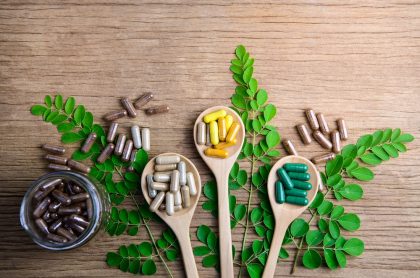Is acid reflux really a problem of too much acid? Part two


In the second part of the series we’ll look at different types of treatments for indigestion, as well as various types of antacids. For the first part of this series click here. Natural medicine always strives to identify the root cause of a condition rather than mask the symptoms – in our case, indigestion. Common causes of indigestion include hypochlorhydria (low stomach acid, associated with an H. pylori infection or inefficient parietal cells due to age, food sensitivities, stress, and chlorine/ fluoride in water), enzyme deficiencies, a weakened lower esophageal sphincter, stress, inadequate chewing of food, eating too much food, reclining/laying down after meals, and eating hurriedly. By assessing the cause of indigestion, we can prevent reflux in the first place, rather than masking the symptoms. A few common causes as well as natural approaches are discussed next.
Causes of Low HCL
There are many contributing factors to low levels of HCL. For starters, zinc, B6, thiamine, chloride, sodium, and potassium are all needed for adequate HCL production, so a deficiency of any of these nutrients can affect production. A diet lacking whole, fresh vegetables and clean protein encourages these deficiencies. Multi-vitamins contain their synthetic counterparts which are much less absorbable. Vegetarians are particularly at risk since meat is the best source of B12 and zinc that can be easily absorbed by the body. In addition, chronic stress and dehydration, even mild, are major contributing factors. Water is needed for HCL production, and stress shuts off the digestive processes. Adequate chewing of food is important for proper digestion. Mindful, stress-free eating and thoroughly chewing food will help reduce the discomfort associated with indigestion.
HCL Supplementation
Believe it or not, you can actually supplement with hydrochloric acid. This has proven to be a very effective therapy. It essentially allows the exhausted parietal cells to rest, and eventually they will kick back into gear and produce adequate levels of HCL. This is particularly effective in combination with pepsin, the gastric protein-digesting enzyme, and other digestive enzyme supplementation.
Digestive Enzymes
Enzymes are catalysts to biochemical activity, meaning they facilitate chemical reactions without being altered themselves. Enzymes are necessary for virtually every metabolic activity that occurs in our bodies, and without them we would die. There are two groups of enzymes: metabolic and digestive. Metabolic enzymes are needed for every chemical reaction that occurs in the human body, including energy, thought production and controlling blood sugar. Digestive enzymes are produced primarily by the pancreas, but also by the stomach, small intestines, and salivary glands, and are needed to break down our food into absorbable forms. Different enzymes are needed to break down different macronutrients. Lipase enzymes break down fats, protease enzymes break down protein, and amylase enzymes break down starches and carbohydrates. In addition, enzymes are present in raw, cultured, or fermented whole foods, which help us break down the food itself. Cooked, packaged, and processed foods have depleted any enzymes that would have been present.
According to Digestive Wellness, “studies reveal that about 10% of 10-year-olds have enzyme deficiencies, 20% of 20-year-olds, 50% of 50-year-olds, and so on.” Enzymes can be supplemented to help lighten the load of the digestive system by helping us adequately break down our food so it can be absorbed. Digestive enzymes should be taken right before a meal. Start with one capsule and see if the symptoms appear. If so, increase to two, and potentially three, until symptoms subside. This will give the pancreas time to “reset” and increase enzyme production.
In summary, these are the ways to reduce indigestion naturally
· HCL supplementation
· Enzyme supplementation
· Stress management
· Thoroughly chewing food
· Eat mindfully and slowly
· Avoid or significantly reduce consumption of caffeine, high-fat meals, orange juice, tomatoes and tomato products, spicy foods, alcohol, and nicotine as these weaken the lower esophageal sphincter
· Chiropractic adjustments can improve blood flow to stomach and normalize HCL production
· Swig raw, unpasteurized apple cider vinegar before each meal
· Try using bitters. These are herbs that have long been used to promote better digestion. They essentially prepare the GI tract for food by stimulating saliva, HCL, pepsin, bile, and digestive enzyme production. They can be purchased at most natural food stores
Treatment via antacids
Other treatments include taking antacids, acid-suppressing drugs. There are three classes of antacids, all of which rely on different mechanisms.
Alkalinizing agents are the only true “antacids,” as they neutralize the acidity of HCL. The other two variations, H2 Blockers and Proton Pump Inhibitors, actually suppress acid production all together.
Alkalinizing Agents
These are the true “antacids.” Instead of suppressing acid production, they neutralize the acidity by raising the pH. This is achieved through the combination of alkalinizing mineral salts, including calcium, magnesium, and aluminum. Many over-the-counter medications for GERD and indigestion relief are in this form.
Calcium: calcium carbonate (Tums, Titrical, Alka-2) provides fast-acting relief of symptoms. It can cause constipation, and has the ability of raising blood calcium levels (hypercalcemia) when used frequently and long-term, which can be very dangerous.
Magnesium: magnesium salt is available as magnesium trisilicate, carbonate, and hydroxide (Milk of Magnesia). The main side effect of this form is diarrhea. Some brands combine magnesium with aluminum (Maalox, Alka- Seltzer, Rolaids, Mylanta) to prevent this.
Aluminum: Amphogel and Alternagel are the two main brands which use aluminum salts in the form of aluminum hydroxide. The primary concern with this form is a decrease in calcium, contributing to osteoporosis, arthritis, and other conditions. These can also cause constipation.
H2 Blockers
H2 blockers block the action of histamine on parietal cells (stomach cells that produce hydrochloric acid), thereby reducing the amount of acid produced since histamine encourages acid production. They can be purchased over-the-counter and relieve symptoms in about half of GERD sufferers. They are more “potent” than other antacids, suppressing acid secretion for 6-24 hours. Since absorption of calcium, folic acid, B12, and other nutrients require the presence of hydrochloric acid, constant suppression poses concern. They may also prevent heartburn episodes, but one study suggested that they rarely provide complete symptom relief from indigestion or dyspepsia. Common brand names include Pepcid AC, Pepsid Oral (both are the most potent H2 blockers), Tagamet and Tagamet HB, Axid capsules and Axid AR, Nizatidine, and all of the Zantac and varieties.
Proton Pump Inhibitors (PPIs)
PPIs suppress stomach acid production by inhibiting the molecule in the stomach glands responsible for acid secretion (the gastric acid pump). PPIs are effective for relieving most symptoms, including heartburn, and can be helpful for those with laryngitis or chest pain caused by GERD. However, because they suppress hydrochloric acid production, typically to less than 10% of normal levels, studies have revealed a correlation between long-term PPI use and osteoporosis and hip fractures most likely caused by calcium deficiencies, as well as B12 deficiencies. Further, long-term use in people with H. pylori can actually cause atrophic gastritis, or chronic stomach inflammation, a precursor to stomach cancer. To make matters worse, PPIs can mask the symptoms of stomach cancer. Common brand names include Prevacid, Nexium, AcipHex, Prilosec, Protonix, and Kapidex. It should be noted that abrupt cessation of PPIs can result in a sudden, fierce production of acid. Therefore, these drugs should be weaned off of slowly.
Similar articles
-
Is there a connection between cancer, diet and CBD?
inAs more and more Americans get sick with cancer, Holistic Cannabis Practitioner Erin Kenney looks at the connection between cancer, diet and CBD.
-
Adaptability is the real way to reduce stress
inI just can’t stand hearing the word ‘stress’ anymore – nearly every health problem is connected to stress and doctors and patients alike both talk about it. In this article, we’re going to discuss how to reduce stress
-
Have Irritable Bowel Syndrome (IBS)? Kimsey to the rescue!
inIn the first part of a two-article series, Master Nutrition Therapist Kimsey Self describes how you can know if you have IBS or if you’re likely to suffer from it.
More in Health
-
Do you really need supplements for a healthy lifestyle?
inMany people regularly ask, “do I really need supplements for a healthy lifestyle?”, and if so, which are the best ones to take?
-
Biohack: how to reap the top health benefits of grounding!
inI’m sure you’ve all heard of grounding, it’s been quite the buzz word recently. But what is it, really, and what are the health benefits of grounding?
-
Discover the power of conscious deep breathing on your health
inBreathing is something the body does without any conscious effort, but the power of conscious deep breathing is definitely no joke!















